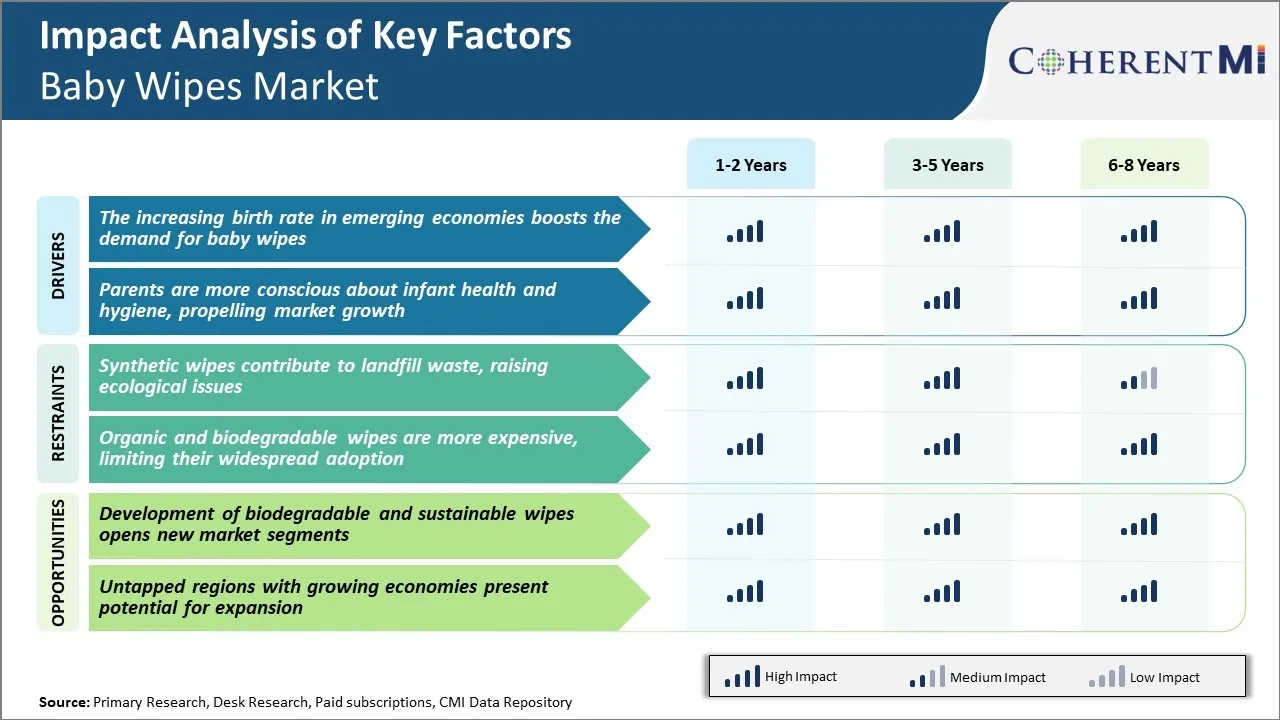Baby Wipes 시장 규모 및 점유율 분석 - 성장 추세 및 예측 (2024 - 2031)
아기 Wipes 시장은 제품(Wet Wipes(Scented, Unscented), Dry Wipes(Cloth-based, Paper-based)), by Material (Synthetic (Polyester, 폴리프로필렌), (Natural, Cotton, Bam....
Baby Wipes 시장 트렌드
시장 드라이버 - Emerging Economies의 출산 비율은 아기 Wipes에 대한 수요를 밀어
유아 인구의 급속한 성장은 자연적으로 근본적인 아기 배려 제품의 더 중대한 소비를 몰고 있습니다. 그리고 그런 indispensable 품목은 아기 와이퍼입니다. 런닝 워터와 같은 기본 편의 시설에 액세스 할 수있는이 개발 지구는 항상 신뢰할 수 없습니다, 부모는 하루 동안 자신의 작은 것들을 청소하고 신선하게 아기 와이퍼의 편리한 팩에왔다. 닦음은 주변에 나르게 쉬운, 가정외에도 사용될 수 있고 그(것)들을 아주 실제 만드는 후에 분리된 세척을 요구하지 않습니다.
또한, 더 많은 여성들이 도시 지역의 인력에 합류하기 때문에, 이중 소득 가족은 유아에게 일반 목욕을주는 것과 같은 chores에 지출하는 더 적은 시간이 있습니다. Wipes는 아기 위생 일상에 보낸 시간을 크게 감소했습니다. 특히 아이들을 위해 caring 만드는 해결책에 있는 일 엄마는 아직 효과적이게 합니다.
따라서, 아기 와이퍼 제조 업체는 우수한 정립, 귀여운 디자인 및 멀티 팩을 통해 엄청난 젊은 인구뿐만 아니라 풍부한 소비자로부터 수요를 캡처 할 수 있습니다. 전 세계 아기 와이퍼 산업의 확장을위한 immense 범위를 표시하는 개발 지구의 인구 통계 및 경제 변화의 확신.
시장 드라이버 - 부모는 더 빈 건강과 위생에 대한 의식, 추진 시장 성장
현대 디지털 시대에서, 새로운 부모는 온라인과 오프라인 모두 다양한 소스에서 최고의 관행에 대한 정보를 지속적으로 공급합니다. 사회 미디어, 부모 웹 사이트, 잡지뿐만 아니라 소아과 의사는 모두 위생의 중요성과 아기의 전반적인 웰빙을위한 깨끗한 환경을 강조합니다.
오늘날의 밀레니엄 엄마와 아빠의 세대는 광범위한 연구 제품 및 성분을 사용하여 가장 안전한 옵션 만 사용됩니다. 그들은 유해한 화학물질, 알레르기, 아기를 위한 품목을 구입하기 전에 증명서 검사하는 상표를 scrutinize. 자연에 초점을 맞추고, 유기 청소는 화합물 대신 식물 근거한 물자에게서 한 향수 자유로운, hypoallergenic 닦음 같이 특징을 위한 증가한 수요로 직접 번역합니다.
상표는 건강 의식적인 부모에게 먹기 위하여 엄격히 개정한 제안이 있습니다. 지금 닦은 것은 여분 연약한 짜임새, 알로에 베라 같이 자연적인 추출물, soothe에 chamomile 및 각 사용 후에 아기 바닥을 습기를 공급합니다. 몇몇 변종은 probiotics, 비타민 또는 다른 면제 승압기로 풍부합니다. Wellness-promoting formulations를 가진 그런 혁신은 질을 위한 프리미엄을 지불하기 위하여 더 많은 takers Willing를 찾아냅니다.
부모는 최고의 위생 일상을 제공하고 올바른 제품을 통해 약간의 웰빙을 돌봐 바랍니다. 유아 위생 및 안전에 대한 전반적인 보호자 우려는 아기 와이퍼 세그먼트에 대한 견고한 기둥 추진을 형성합니다.

시장 도전 - 매립 폐기물, Raising Ecological Issue
아기 와이퍼 시장에 직면 한 주요 도전 중 하나는 생물 분해성이없는 합성 물질의 사용입니다. 대부분의 아기 와이퍼는 현재 폴리에틸렌과 폴리 프로필렌과 같은 플라스틱을 함유하고 있으며 오랜 기간 동안 매립지에서 깨지지 않습니다.
아기 와이퍼는 각 기저귀 변화 후 분해되는 단일 용도 제품이어야하며 비 생물 분해성 자연은 매년 도시형 폐기물 흐름에 들어가는 거대한 양의 플라스틱 폐기물로 이어졌습니다. 통계는 100 억 이상의 아기 와이퍼가 전 세계 주요 시장에서 매년 매립지로 끝날 것으로 예상됩니다.
과도한 매립물에 있는 플라스틱 쓰레기의 이 축적은 미생물 오염과 같은 생태 문제점을 exacerbating입니다. 합성 닦음에서 Harmful 화학물질은 십년간에 지상 물 근원으로 침식할 수 있습니다. 또한 아기 와이퍼에 대한 비 재생성 플라스틱을 만드는 생산 공정의 탄소 발자국에 대한 공공의 우려가 있습니다.
유럽 및 북미의 환경 기관은 일반적인 아기 와이퍼 재료의 분해성에 대한 우려를 기울였습니다. 이것은 지속 가능성 목표에 초점을 맞추고 브랜드의 규제 및 평판 압력을 추가합니다. 석유 기반 플라스틱의 사용은 환경 관점에서 아기 와이퍼 산업의 장기적인 성장 전망에 중요한 도전을 포화합니다.
시장 기회 – Biodegradable 및 Sustainable Wipes의 개발은 새로운 시장 세그먼트를 엽니다
아기 와이퍼 시장에서 선수를위한 하나의 주요 기회는 더 친환경 제품 정립에 대한 상승 수요입니다. 플라스틱 오염 및 기후 변화와 같은 문제에 대한 인식 증가로 소비자는 아기 관리와 같은 개인 배려 범주에서 지속 가능한 대안을 찾고 있습니다.
대나무, 유기면 및 목재 펄프와 같은 식물 기반 섬유로 만든 생물 분해성 와이퍼의 개발은 녹색 옵션으로이 소비자 이동을 캡처 할 수있는 거대한 기회를 제공합니다. 이러한 천연 재료는 환경 발자국을 줄이기 위해 몇 달 안에 완전히 degrade를 가능하게합니다.
시장 조사는 biodegradable 와이퍼 세그먼트가 가장 빠르게 성장하는 범주 중 하나가 될 것으로 예상되며 향후 5 년 동안 8 % 이상의 CAGR에서 확장됩니다. 지속가능성에 위치한 소설 제품 라인을 출시 할 수있는 기회입니다.
Leading Company는 아기 피부를 위해 찬성된 자연적인 항균 본질을 가진 biopolymers를 결합하는 유일한 조리법을 혁신합니다. 바다 플라스틱 감소와 같은 원인을 위해 윤리적 제안 및 브랜드 crusading에 대한 프리미엄을 명령 할 수있는 기회가 있습니다. 전반적으로, 생물 분해성 닦음은 확장 웰빙 집중된 자연적인 개인적인 배려 분야에 있는 첫번째 mover 이점을 얻는 가능하게 합니다.